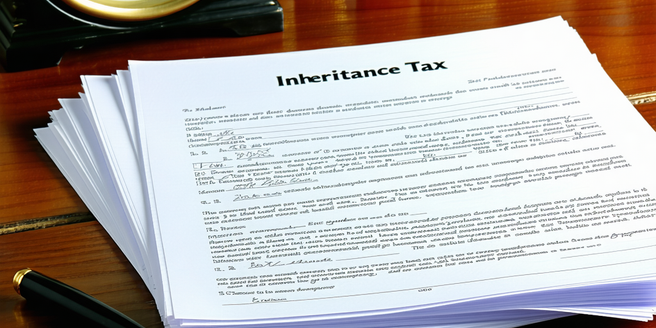
Understanding Inheritance Tax Basics
| Concept | Explanation | Example |
| Threshold | The minimum estate value that triggers tax. | $325,000 in the UK. |
| Rate | Percentage applied to the taxable portion of the estate. | 40% above threshold for many countries. |
| Exemptions | Assets transferred to spouse or charity that may not be taxed. | 100% to spouse or charity. |
| Gifts | Monetary transfers made before death. | Annual exemption limits. |
| Trusts | Legal arrangements holding assets for beneficiaries. | Discretionary or fixed. |
Identifying Common Tax Pitfalls
Avoiding inheritance tax pitfalls requires careful planning and awareness of common mistakes that could increase your tax liability. One frequent pitfall is failing to make use of available exemptions and allowances, such as annual gift exemptions and spousal transfer benefits. Another common mistake is neglecting to update estate planning documents after major life events like marriage, divorce, or the birth of a child. Poor record-keeping can also lead to overlooked entitlements or unclaimed reliefs, complicating the tax process. Understanding the rules concerning lifetime gifts and planning these transfers effectively is crucial, as inappropriate allocation can lead to unexpected tax burdens. Consulting with professionals can help in recognizing potential pitfalls and devising strategies tailored to your unique circumstances.
Utilizing Gift Exemptions Effectively
Proper use of gift exemptions is a smart strategy to reduce potential inheritance tax liabilities. Annual gift exemptions allow individuals to gift a certain amount each year to others without these amounts counting towards their taxable estate. This is particularly useful in distributing accumulated wealth gradually over the years rather than in one large transfer at the time of passing, which would likely be subject to inheritance tax. Furthermore, there are specific exemptions for life events such as weddings, which can be taken advantage of. Being strategic about gift giving avoids unintentional tax consequences and requires meticulous record-keeping of all transactions. By utilizing these exemptions efficiently, you can minimize the taxable estate value, thus affording heirs a larger share of your wealth.
Strategic Use of Trusts in Estate Planning
Trusts are powerful estate planning tools that can help manage and protect your assets while potentially reducing your tax liabilities. Strategic use of trusts can shield certain estate values from immediate taxation by setting the terms for distribution over time or across generations. Different types of trusts offer varying levels of control and tax efficiency. For example, discretionary trusts provide flexibility in income distribution to beneficiaries, which can optimize tax position based on their circumstances. Fixed trusts ensure set distributions, which might be necessary for certainty in estate plans. Utilizing trusts effectively can ensure that you meet specific goals, such as caring for a dependent or supporting a charitable cause, while also optimizing the tax impact.
Exploring Life Insurance Policy Benefits
Life insurance policies play a dual role in estate planning by providing financial security to beneficiaries and potential benefits in terms of tax efficiency. When structured correctly, the payout from a life insurance policy can be often exempt from inheritance tax, providing a substantial benefit to your beneficiaries. Additionally, policies can also be placed in trust, ensuring the proceeds are kept outside of the taxable estate, thus expediting the distribution process and circumventing probate delays. This can offer peace of mind that funds will be available promptly to cover expenses like outstanding debts or funeral costs. Reviewing and understanding your life insurance policy options is crucial for optimizing the estate planning process.
Maximizing Charitable Donations for Tax Relief
Charitable donations present a strategic opportunity to support causes you care about while reducing your estate’s taxable value. Gifts to qualified charities are generally exempt from inheritance tax, effectively lowering the portion of the estate subject to taxation. This not only aids the beneficiaries but also ensures that more of your resources go toward meaningful societal contributions. Donors can choose specific programs or general funds, with the option to set these up as lifetime gifts or as part of a will. Moreover, utilizing legacy provisions, such as setting up a charitable remainder trust, can provide income in life and benefit the charity upon your passing, offering both immediate tax relief and supporting a chosen cause in perpetuity. Carefully planning charitable contributions can be a tax-efficient approach to philanthropy.
Leveraging Spousal Transfers Wisely
Spousal transfers are an often-overlooked aspect of estate planning offering significant tax benefits. In many jurisdictions, assets transferred to a surviving spouse or civil partner are exempt from inheritance tax, regardless of the amount. This exemption serves as a vital tool in ensuring the financial security of the surviving spouse. Utilizing this exemption effectively can help consolidate and manage an estate’s tax position. Additionally, it helps in equalizing the inheritance tax allowance between partners, especially when there is concern about exceeding the individual threshold. After a spouse’s death, further planning might be required to manage the eventual transfer to the next generation to avoid a substantial tax burden. Spousal transfer can be a key strategy in ensuring that the estate is preserved for future beneficiaries.
Staying Updated on Tax Law Changes
The landscape of tax laws is ever-evolving, with amendments and reforms potentially affecting inheritance tax strategies. Staying informed about these changes is crucial for effective estate planning. As tax laws continue to change, staying updated can make the difference between a well-managed estate and unforeseen liabilities. Tax law alterations can introduce new thresholds, rates, or reliefs that impact your estate’s tax position. Regular consultation with a tax advisor or estate planning professional can ensure your strategies remain compliant and optimized for current regulations. In today’s fast-paced financial world, even minor legislative tweaks can have significant implications. Additionally, understanding proposed legislative changes can offer foresight into future planning needs, ensuring proactive measures can be taken to safeguard your estate’s value. An informed approach to taxation is essential for sound financial management.
Consulting with Estate Planning Experts
Estate planning can be complex, necessitating guidance from professionals well-versed in the nuances of inheritance tax laws. Engaging with experts ensures that individuals can navigate the intricacies of estate planning with confidence. Advisors can offer tailored advice specific to your financial situation, considering factors such as asset composition, family considerations, and long-term goals. They help you understand how legal and financial strategies can be leveraged to meet your objectives effectively. Moreover, expert consultation can identify potential gaps or overlooked opportunities that an untrained eye might miss. Collaborative planning with accountants, lawyers, and financial advisors can consolidate all aspects of estate management, ensuring that assets are protected and taxes are minimized for future generations.
Evaluating Long-Term Planning Options
Long-term estate planning involves foresight and flexibility, accounting for both anticipated and unforeseen changes in life circumstances and tax regulations. It requires evaluating different strategies that align with your personal and familial goals while efficiently managing tax implications. Consider incorporating diversified investments that may impact tax liability or adjusting trust structures to meet evolving needs. Consulting with financial advisors and legal experts can provide valuable insights and guidance throughout the process. Additionally, regularly revising an estate plan to reflect life changes or shifts in family dynamics is essential. Engaging with this process early and updating it periodically ensures that your estate plan remains effective, providing clarity and financial security for yourself and your beneficiaries.

